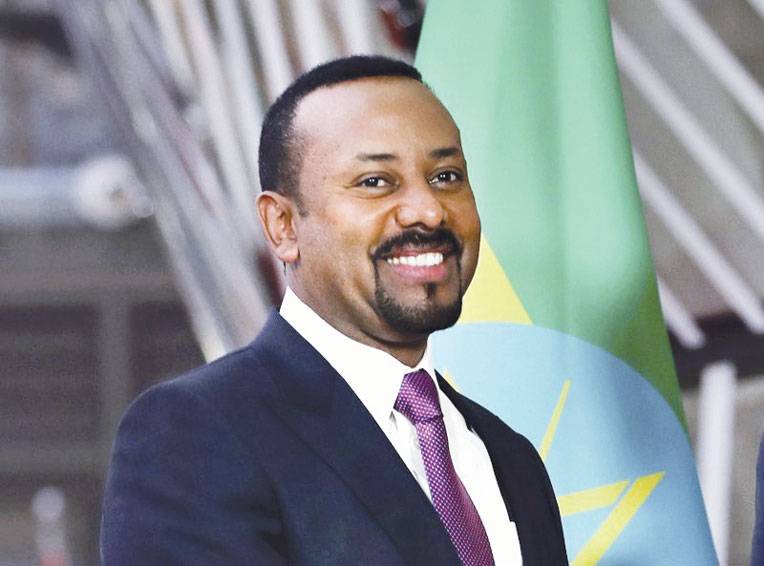ADDIS ABABA - Ethiopian Prime Minister Abiy Ahmed won the Nobel Peace Prize for 2019 in recognition of his efforts to end his country’s two-decade border conflict with Eritrea.
The Norwegian Nobel Institute on Friday also praised the “important reforms” that Abiy, Ethiopia’s leader since April 2018, has launched at home. The prize comes as Abiy faces pressure to uphold the sweeping freedoms he introduced, and critics warn that his ability to deal with rising domestic unrest may be slipping.
The Nobel committee said some people may consider it too early to give him the prize, but “it is now that Abiy Ahmed’s efforts need recognition and deserve encouragement.”
The award, the 100th Nobel Peace Prize, reflects the committee’s taste for trying to encourage works in progress.
Abiy said he was “humbled and thrilled.” In a call with the Nobel committee, he laid out his hope that the award will be taken “positively” by other African leaders “to work on (the) peacebuilding process on our continent.”
Abiy, 43, took office after widespread protests pressured the longtime ruling coalition and hurt one of the world’s fastest growing economies. Africa’s youngest leader quickly announced dramatic reforms and “Abiymania” began.
On taking office, Abiy surprised people by fully accepting a peace deal ending a 20-year border war between the two East African nations that saw tens of thousands of people killed. Ethiopia and Eritrea had not had diplomatic ties since the war began in 1998, with Abiy himself once fighting in a town that remained contested at the time of his announcement last year.
Within weeks, the visibly moved Eritrean president, Isaias Afwerki, visited Addis Ababa and communications and transport links were restored. For the first time in two decades, long-divided families made tearful reunions.
The improving relations led to the lifting of United Nations sanctions on Eritrea, one of the world’s most reclusive nations. But Ethiopia’s reforms do not appear to have inspired any in Eritrea, which has since closed border posts with its neighbor.
The Nobel committee also pointed to Abiy’s other efforts toward reconciliation in the region — between Eritrea and Djibouti, between Kenya and Somalia, and in Sudan.
Ethiopia is Africa’s second-largest country in terms of population with about 110 million people.
Eritrea, which has a population of about 4 million, gained independence from Ethiopia in 1993 after a 30-year guerrilla war. About 80,000 people died in a war between the two countries from 1998-2000.
The Nobel committee acknowledged that “peace does not arise from the actions of one party alone.”
It said that when Abiy “reached out his hand, President Afwerki grasped it, and helped to formalize the peace process between the two countries.”
It added that it “hopes the peace agreement will help to bring about positive change for the entire populations of Ethiopia and Eritrea.”
The government of Eritrea, still one of the world’s most closed-off nations, did not immediately comment but its ambassador to Japan tweeted congratulations, adding: “People of #Eritrea & #Ethiopia with blood, sweat & tears have won again over evil.”
Leaders elsewhere in Africa, including those of Liberia, Ghana and neighboring Somalia, responded with praise and encouragement. U.N. Secretary-General Antonio Guterres said he has often stated that “winds of hope are blowing ever stronger across Africa” and that Abiy was one of the main reasons why.
The U.S. Embassy in Ethiopia joined in the congratulations, noting the “incredible progress” made under Abiy.
At home, Abiy offered one political surprise after another. He released tens of thousands of prisoners, welcomed home once-banned opposition groups and acknowledged past abuses. People expressed themselves freely on social media, and he announced that Ethiopia would hold free and fair elections in 2020. The country has one of the world’s few “gender-balanced” Cabinets and a female president, a rarity in Africa.
And for the first time Ethiopia had no journalists in prison, media groups noted last year.
The new prime minister also announced the opening-up of Ethiopia’s tightly controlled economy, saying private investment would be welcome in major state-owned sectors — a process that continues slowly.
But while Abiy became a global darling, speaking at the World Economic Forum in Davos, Switzerland, troubles arose at home.
A grenade was thrown at him during an appearance in the capital. A large group of soldiers confronted him in his office in what he called an attempt to derail his reforms. In a display of the brio that has won Abiy widespread admiration, the former military officer defused the situation by dropping to the floor and joining the troops in pushups.
More troubling these days are Ethiopia’s rising ethnic tensions, as people once stifled by repression now act on long-held grievances. Some 1,200 people have been killed and some 1.2 million displaced in the greatest challenge yet to Abiy’s rule. Some observers warn that the unrest will grow ahead of next year’s election.
The Nobel committee acknowledged that “many challenges remain unresolved.”
Amnesty International secretary Kumi Naidoo said the award should “push and motivate (Abiy) to tackle the outstanding human rights challenges that threaten to reverse the gains made so far.”
“He must urgently ensure that his government addresses the ongoing ethnic tensions that threaten instability and further human rights abuses,” Naidoo said.
Abiy had been among the favorites for this year’s prize in the run-up to Friday’s announcement, though winners are notoriously hard to predict. The Nobel committee doesn’t reveal the names of candidates or nominations for 50 years.
With the glory comes a 9-million kronor ($918,000) cash award, a gold medal and a diploma. Even though the peace prize is awarded in Norway, the amount is denominated in Swedish kronor.






